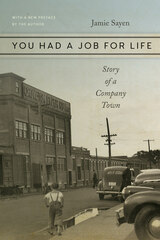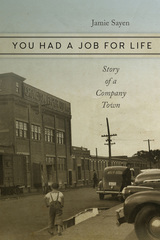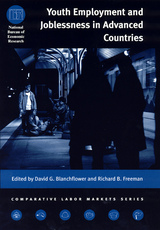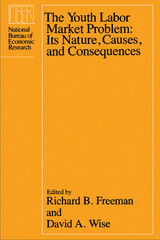343 books about Labor & Industrial Relations and 5
start with Y
343 books about Labor & Industrial Relations and 5
343 books about Labor & Industrial Relations
5 start with Y start with Y
5 start with Y start with Y

You Had a Job for Life
Story of a Company Town
Jamie Sayen
Brandeis University Press, 2023
A local story with profound national implications, now available as a paperback with a new preface by the author.
Absentee owners. Single-minded concern for the bottom line. Friction between workers and management. Hostile takeovers at the hands of avaricious and unaccountable multinational interests. The story of America’s industrial decline is all too familiar—and yet, somehow, still hard to fathom. Jamie Sayen spent years interviewing residents of Groveton, New Hampshire, about the century-long saga of their company town. The community’s paper mill had been its economic engine since the early twentieth century. Purchased and revived by local owners in the postwar decades, the mill merged with Diamond International in 1968. It fell victim to Anglo-French financier James Goldsmith’s hostile takeover in 1982, then suffered through a series of owners with no roots in the community until its eventual demise in 2007. Drawing on conversations with scores of former mill workers, Sayen reconstructs the mill’s human history: the smells of pulp and wood, the injuries and deaths, the struggles of women for equal pay and fair treatment, and the devastating impact of global capitalism on a small New England town. This is a heartbreaking story of the decimation of industrial America.
Absentee owners. Single-minded concern for the bottom line. Friction between workers and management. Hostile takeovers at the hands of avaricious and unaccountable multinational interests. The story of America’s industrial decline is all too familiar—and yet, somehow, still hard to fathom. Jamie Sayen spent years interviewing residents of Groveton, New Hampshire, about the century-long saga of their company town. The community’s paper mill had been its economic engine since the early twentieth century. Purchased and revived by local owners in the postwar decades, the mill merged with Diamond International in 1968. It fell victim to Anglo-French financier James Goldsmith’s hostile takeover in 1982, then suffered through a series of owners with no roots in the community until its eventual demise in 2007. Drawing on conversations with scores of former mill workers, Sayen reconstructs the mill’s human history: the smells of pulp and wood, the injuries and deaths, the struggles of women for equal pay and fair treatment, and the devastating impact of global capitalism on a small New England town. This is a heartbreaking story of the decimation of industrial America.
[more]

You Had a Job for Life
Story of a Company Town
Jamie Sayen
University Press of New England, 2017
Absentee owners. Single-minded concern for the bottom line. Friction between workers and management. Hostile takeovers at the hands of avaricious and unaccountable multinational interests. The story of America’s industrial decline is all too familiar—and yet, somehow, still hard to fathom. Jamie Sayen spent years interviewing residents of Groveton, New Hampshire, about the century-long saga of their company town. The community’s paper mill had been its economic engine since the early twentieth century. Purchased and revived by local owners in the postwar decades, the mill merged with Diamond International in 1968. It fell victim to Anglo-French financier James Goldsmith’s hostile takeover in 1982, then suffered through a series of owners with no roots in the community until its eventual demise in 2007. Drawing on conversations with scores of former mill workers, Sayen reconstructs the mill’s human history: the smells of pulp and wood, the injuries and deaths, the struggles of women for equal pay and fair treatment, and the devastating impact of global capitalism on a small New England town. This is a heartbreaking story of the decimation of industrial America.
[more]

You Work Tomorrow
An Anthology of American Labor Poetry, 1929-41
John Marsh, Editor
University of Michigan Press, 2007
"An outstanding piece of scholarship and a welcome contribution to the field, this collection of neglected but powerful poetry speaks to our own time as much as it does to its own era."
---Nicholas Coles, University of Pittsburgh
---Nicholas Coles, University of Pittsburgh
"Opens up a dramatic new aspect of American literature for study, discussion, and enjoyment. The collection of poems is original and engaging and is sure to be useful for classes in literature, American history, and labor studies."
---Alan Wald, University of Michigan
---Alan Wald, University of Michigan
You Work Tomorrow provides a glimpse into a relatively unknown aspect of American literary and labor history---the remarkable but largely forgotten poems published in union newspapers during the turbulent 1930s. Members of all unions---including autoworkers, musicians, teachers, tenant farmers, garment workers, artists, and electricians---wrote thousands of poems during this period that described their working, living, and political conditions. From this wealth of material, John Marsh has chosen poetry that is both aesthetically appealing and historically relevant, dispelling the myth that labor poetry consisted solely of amateurish and predictable sloganeering. A foreword by contemporary poet Jim Daniels is followed by John Marsh's substantive introduction, detailing the cultural and political significance of union poetry.
John Marsh is Assistant Professor of English at the University of Illinois at Urbana-Champaign and Coordinator of The Odyssey Project, a year-long, college-accredited course in the humanities offered at no cost to adults living below or slightly above the federal poverty level.
A volume in the series Class : Culture
[more]

Youth Employment and Joblessness in Advanced Countries
Edited by David G. Blanchflower and Richard B. Freeman
University of Chicago Press, 2000
The economic status of young people has declined significantly over the past two decades, despite a variety of programs designed to aid new workers in the transition from the classroom to the job market. This ongoing problem has proved difficult to explain. Drawing on comparative data from Canada, Germany, France, Sweden, and the United Kingdom, these papers go beyond examining only employment and wages and explore the effects of family background, education and training, social expectations, and crime on youth employment.
This volume brings together key studies, providing detailed analyses of the difficult economic situation plaguing young workers. Why have demographic changes and additional schooling failed to resolve youth unemployment? How effective have those economic policies been which aimed to improve the labor skills and marketability of young people? And how have youths themselves responded to the deteriorating job market confronting them? These questions form the empirical and organizational bases upon which these studies are founded.
This volume brings together key studies, providing detailed analyses of the difficult economic situation plaguing young workers. Why have demographic changes and additional schooling failed to resolve youth unemployment? How effective have those economic policies been which aimed to improve the labor skills and marketability of young people? And how have youths themselves responded to the deteriorating job market confronting them? These questions form the empirical and organizational bases upon which these studies are founded.
[more]

The Youth Labor Market Problem
Its Nature, Causes, and Consequences
Edited by Richard B. Freeman and David A. Wise
University of Chicago Press, 1982
This volume brings together a massive body of much-needed research information on a problem of crucial importance to labor economists, policy makers, and society in general: unemployment among the young. The thirteen studies detail the ambiguity and inadequacy of our present standard statistics as applied to youth employment, point out the error in many commonly accepted views, and show that many critically important aspects of this problem are not adequately understood. These studies also supply a significant amount of raw data, furnish a platform for further research and theoretical work in labor economics, and direct attention to promising avenues for future programs.
[more]
READERS
Browse our collection.
PUBLISHERS
See BiblioVault's publisher services.
STUDENT SERVICES
Files for college accessibility offices.
UChicago Accessibility Resources
home | accessibility | search | about | contact us
BiblioVault ® 2001 - 2024
The University of Chicago Press









